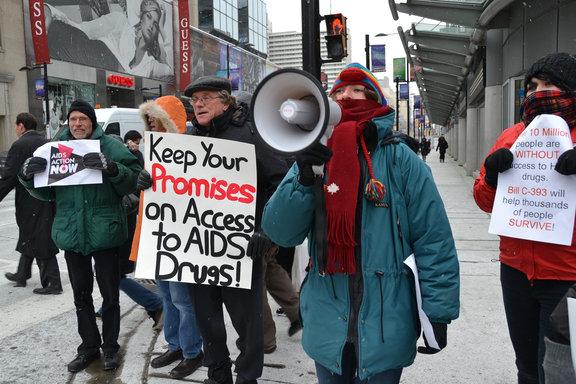As bewildered holiday shoppers scurry by, a couple dozen students and activists are lying in the intersection of Yonge and Dundas streets on Dec 13 for a “die-in,” to draw attention to a bill that could provide cheaper medications to those suffering with HIV/AIDS in developing countries.
“What do we want? Access! When do we want it? Now!” the protesters scream, repeated from all four corners, as others spontaneously “die” in the intersection.
As soon as the all-way crossing signal comes on, about 30 people run to the centre from all four corners, lie flat on their backs or in the fetal position, and hold signs across their bodies demanding Canada take action.
“This is creating a medical apartheid!” one protestor screams through a megaphone. “We should not allow big pharma to make more money. Support Bill C-393!”
The series of die-ins continues for about 30 minutes. During the final die-in, protestors refuse to get up when the lights change, leaving honking motorists to wait for several minutes. As the call for medication access gets louder, frustrated drivers lay on their horns.
“So many people die without access to medications, so this is bringing people’s focus to that,” says protest organizer Jolene Cushman, adding that more than 10 million people internationally go without access to HIV/AIDS medications. “Canada has a real, fundamental role to play to create a more accessible environment for more HIV/AIDS medications.”
Bill C-393, a private member’s bill in Parliament, attempts to fix Canada’s Access to Medicines Regime (CAMR) by cutting through the red tape blocking its use, Cushman says. The bill’s one-licence solution would allow generic pharmaceutical companies to distribute low-cost AIDS medication to multiple countries in need.
The House of Commons must restore this key provision, she says. Debate on the bill is anticipated to resume on Dec 16; it’s one of the items on the parliamentary agenda before the House rises for the holidays.
With debate coming up soon, Richard Elliott, executive director of the HIV/AIDS Legal Network, says it’s critical to bring the public’s attention to this issue.
In 2004, Parliament unanimously created CAMR, pledging to help supply developing countries with lower-cost generic drugs. Elliott says it’s a law that should be getting lower cost generic drugs to developing countries.
“But it’s really been a failure,” he says. “We’ve only seen one export of AIDS drugs to one country,” he says. “And we know why that is. It’s because there’s all sorts of red tape in the law now.
“So this is going to cut through that red tape, so we can actually get the law to work. It gets affordable drugs out to developing countries to save millions of lives.”
Elliott says big pharmaceutical companies are putting pressure on the federal government to ensure the bill is never passed.
“There is a really strong counter-lobby from big pharma, and so far the Conservative government have been opposing it, although there are some Conservative MPs who are supportive,” Elliott says. “At the end of the day, this is going to come down to MPs are going to side with protecting the patents of big pharma on AIDS drugs and other drugs.”
AIDS Action Now’s Alex McClelland, Tim McCaskell and Zoë Dodd also participate in the die-in.
“We want this bill to go through, we want it reformed and we don’t want it to die. Big pharma really wants it to die,” Dodd says. “This is about saving people’s lives.”

 Why you can trust Xtra
Why you can trust Xtra


